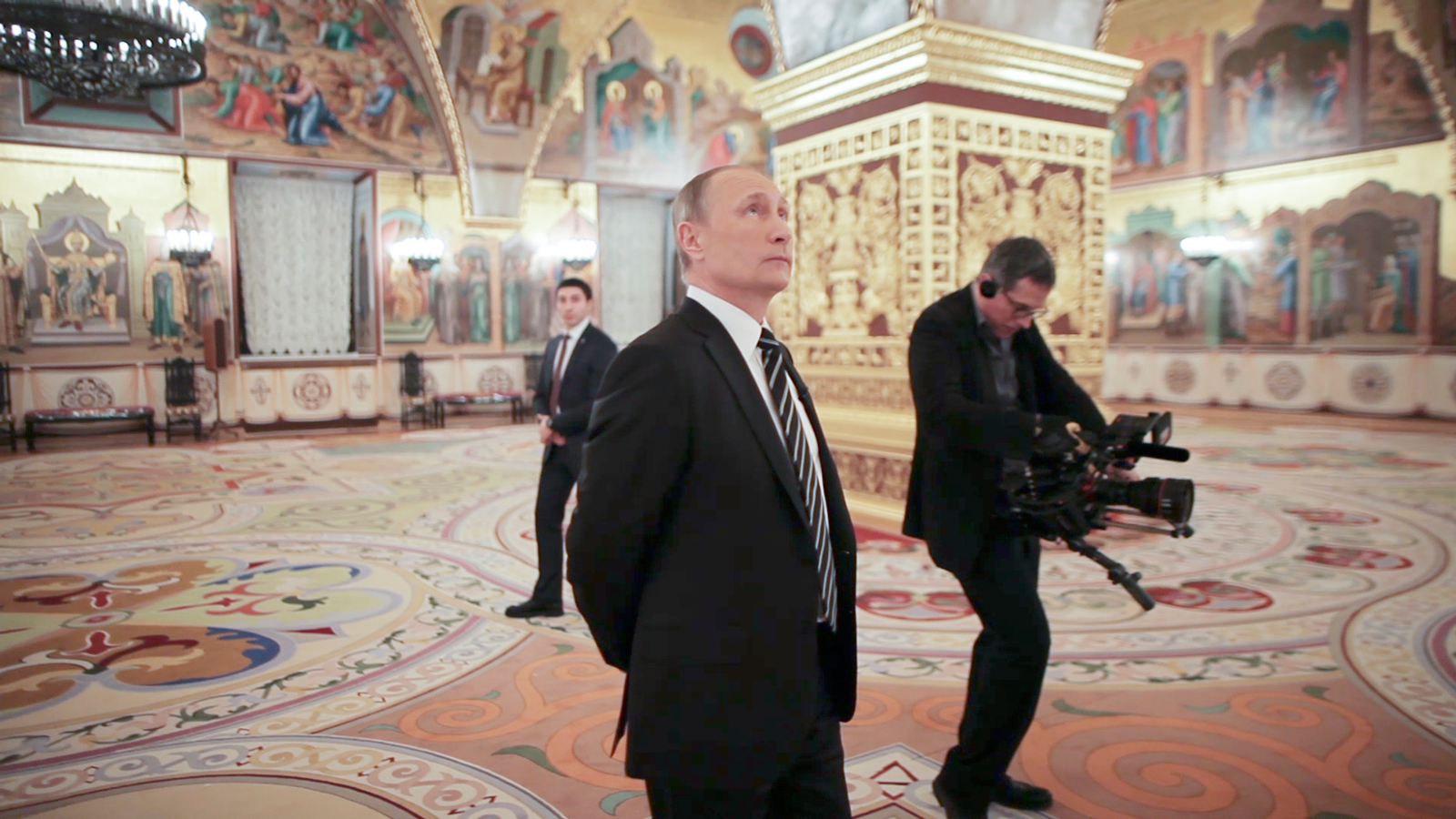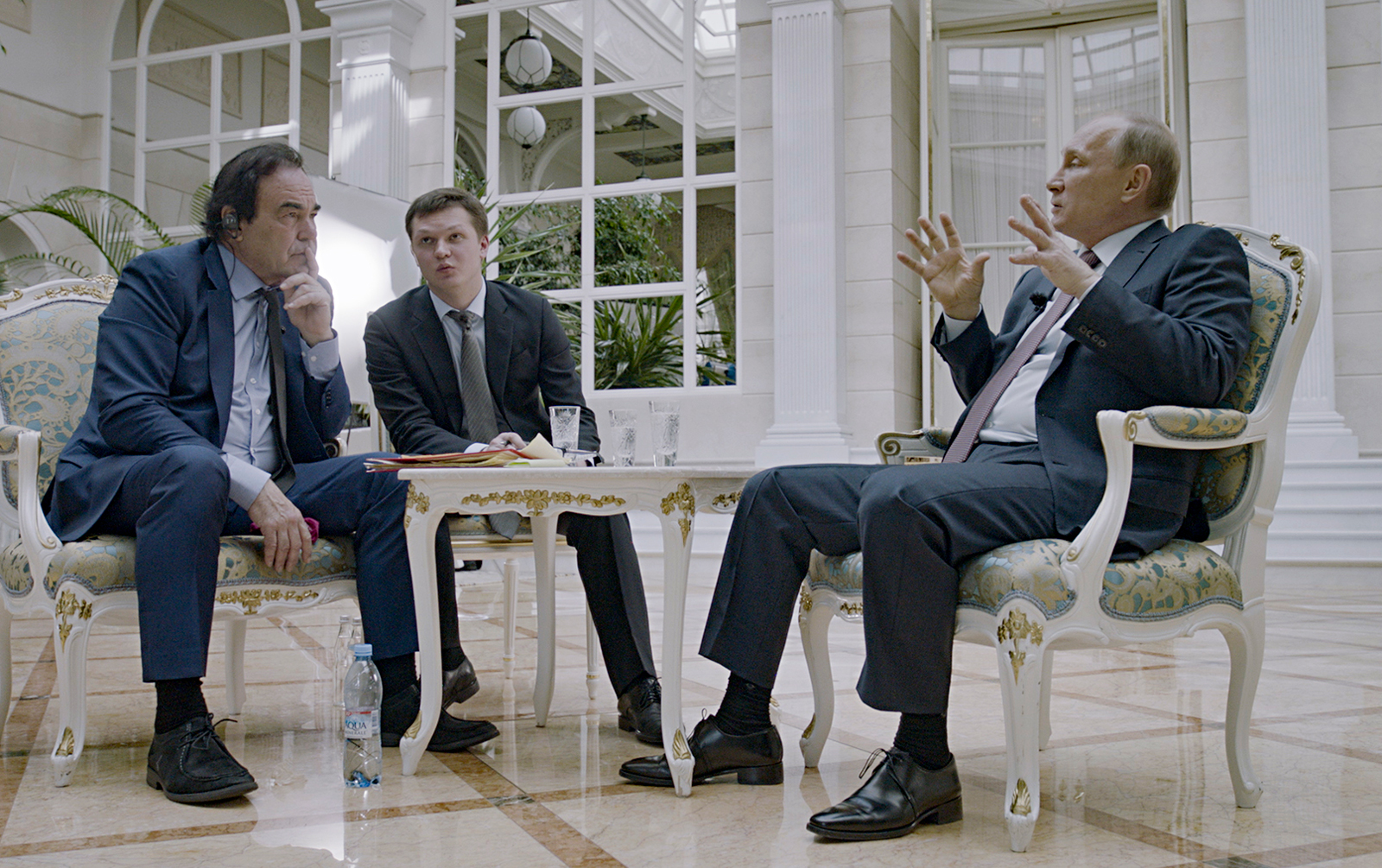There is at least one truly unguarded moment in The Putin Interviews, Oliver Stone’s new four-part documentary series: Putin is showing Stone aerial spy footage of Daesh trucks shipping oil across Syria to Turkey, and Stone asks why Putin doesn’t just get together with Turkey’s President Erdoğan to clear up their mutual distrust. Putin bursts out laughing in disbelief.
But most of their discussions are revealing in a rather different way. When Putin tells Stone in the second episode that his presidential residence is twenty minutes from the Kremlin, he neglects to mention that this driving time is made possible only by having the police clear and close intervening roads so that the presidential motorcade can hurtle into town at eighty miles an hour. So it is with almost everything that Putin says in his conversations with Stone. At best each claim requires a paragraph of small print explaining the facts that have been left out. At worst, the facts are left out entirely. As, for example, in Putin’s assertion that “We have hundreds of TV and radio companies, and the state doesn’t control them in any fashion.” Or again: “We never interfere within the domestic affairs of other countries.”
Why does Putin say these things? Surely not because he particularly expects anybody to believe them, though that would be a bonus; nor because they are part of some ideology that he is bound to uphold, much as every official was required to lie about everything in Soviet times. Putin has absolute power and he can say what he likes. Nobody in Russia would be shocked by the information that the state controls the media, nor that Russia bullies and subverts the governments of other countries. (The Putin Interviews, which first aired on Showtime last week, is being broadcast in Russia June 19-22.)
Putin lies as a display of power. Only powerful people can lie and get away with it. The more blatant the lie, the greater the show of power when your listener cannot or dare not contradict you.
It’s easy to see why Stone puts up with being lied to. He needs Putin’s indulgence to make the series. The harder question is why Putin made so much time for Stone, given that Putin has a country to run.
You have to assume that Putin enjoys Stone’s company, at least initially. Putin seems to have a thing for big old bruisers, given his history with Gerard Depardieu and Steven Seagal, perhaps because they are so much the antithesis of his trim, wiry, well-pressed self. And perhaps Putin was genuinely hoping to learn something from the process. The intelligent autocrat must always be open to new ideas for increasing his power and wealth.
But Stone does not have much to offer, and Putin cannot help but run rings around him for three of the four interviews. In the final part, with no more access left to lose, Stone makes a show of badgering Putin about whether Russia hacked the 2016 US presidential election; and Putin obliges by seeming a bit ruffled. But no serious harm is done, and Putin gets equal time to argue that the US has interfered in Russian elections for many years by funding opposition movements.
Putin is a persuasive speaker because his arguments are internally coherent once you accept his premise that Russia always means well. There is also Putin’s mastery of detail. He is probably the world’s best-informed person about Russia. Of course he is—he needs to know all the facts in order to depart from them.
In response to befuddled questions from Stone, Putin delivers a crisp account of how the Central Bank Of Russia works, a précis of the Anti-Ballistic Missile Treaty, a short history of Russian nuclear weaponry, comparative statistics for national defense spending around the world, and he is about to give an explanation of how the Kremlin is heated when thankfully something interrupts him.
There are no nasty questions. Stone shows no curiosity about Russia’s excesses in the wars in Chechnya, nor about the shooting down of Malaysian Airlines flight 17 in July 2014 as it flew over pro-Russian eastern Ukraine, nor about the bombing of four apartment blocks in three Russian cities in 1999 which played a crucial part in Putin’s rise to president. (The Review reported the grounds for suspecting official involvement in the bombings in 2012.) A question about Putin’s private wealth is politely raised and smilingly slapped down.
In the absence of any serious disagreements between Putin and Stone, the interviews have many longueurs—if these four hours are the highlights from nineteen hours of filming, what on Earth was left out?—but they are never wholly without interest. The trade-off for Stone’s obsequiousness is that he gets what they call in the Kremlin “access to the body” to a degree that no Western interviewer has previously enjoyed. Who knew that Putin had a private chapel? Or three offices in the Kremlin alone?
Advertisement
Archive footage is used marvelously well. The glimpse of Boris Yeltsin’s televised resignation speech on the last day of 1999 is almost unbearable. Yeltsin struggles to form the words needed to tell the Russian people that he is leaving. He grunts and wheezes. The sight and sound of this collapsing human soufflé is more than enough to explain why Russians were so pleased to have Vladimir Putin instead. Putin was capable of walking straight and forming whole sentences.
Comparisons of The Putin Interviews with the Nixon/Frost interviews of 1977 are wildly misplaced. Whereas Frost set out to extract from Nixon an admission of guilt for Watergate, there seems to be nothing in particular that Stone wishes to extract from Putin; indeed, much of the time Stone seems scarcely prepared, and happy to let Putin lead.
That said, nobody could properly prepare to quiz Putin about his work, because nobody outside the inner circle of the Russian government has much idea of what Putin does all day, nor how his power is exercised. How does a small man with highly polished shoes persuade a nation of 144 million people to live in awe of him? When Putin invites Stone into the Kremlin situation room to observe what he says are his daily video-linked conversations with regional and Defense Ministry officials, it is impossible to tell whether the banalities they exchange—“Right now there are no traffic jams in the Ural Federal District”—have been scripted for the occasion, or whether that is what the governance of Russia is like most of the time.
At almost every turn in the interviews Putin sends conciliatory signals to the United States—a point that Stone himself underlined later in conversation with Stephen Colbert. Putin praises Barack Obama, John McCain, and other American politicians. He talks repeatedly of potential “partnerships.” His tone is much warmer than you would have expected given the public diplomacy between Russia and America at the time the interviews were recorded, between July 2015 and February 2017. Tensions were high after the flight of Edward Snowden to Moscow, amid crisis after crisis in Ukraine, including Russia’s annexation of Crimea, and with American allegations of Russian election-hacking gaining momentum.
Putin could have used his time with Stone to rant and bluster, which he always does very well. Instead we mostly get Nice Putin, reasonable and constructive, if just a little bitter that nobody outside Russia understands him. Nice Putin’s message distills into something like this: “I am an intelligent person, here is my view of the world, agree with me and we can work together.”
In Nice Putin’s account, the problems of the world do not arise because other countries are evil, they arise because other countries are mistaken. He tells Stone that America was mistaken to prolong its occupation of Afghanistan and mistaken in its support for the Arab Spring. Europe is mistaken in fearing Russia because it confuses Russia with the Soviet Union. Even Russia was mistaken in the past, before Putin. Only Russia is not mistaken now.
Over time the value of The Putin Interviews will probably rise: they are an exceptional document of a world-changing leader speaking at great length. But at this moment of release they are drained of immediate impact by virtue of being overtaken by events, referencing for most of their duration a world in which Barack Obama is president, Hillary Clinton is expected to be his successor, and Russian interference in the US election is only just beginning to be an issue. President Trump does not pop up until the fourth and final episode and then as an unknown quantity.
It is, of course, not only on the American side that things change. If Stone had gone to the Kremlin this past week he would have had to maneuver his way past some of the biggest anti-Putin demonstrations in years, led by the anti-corruption activist Alexei Navalny, as Masha Gessen reported on June 14. For Stone, Putin is still the miracle worker who got Russia back into working order after it had collapsed under Yeltsin. But for most of the past decade the Russia economy has been undermined by low oil prices and the cumulative effects of corruption and cronyism. Navalny’s rise strongly suggests that fatigue with Putin is growing to the point at which a serious political challenge is becoming possible—or, at least, a challenge might be possible if Putin did not control the political process, and if intransigent critics of Putin did not have an awkward habit of ending up dead.
Advertisement
There is a touching moment when Putin thinks back to his appointment as acting prime minister in 1999. His main concern, he says, was “Where to hide my children.” Russia in those days—to some extent even now—was The Sopranos writ large. A respectable adversary was one who might kill you but not your family.
In 2001 I sat by chance behind Putin’s two daughters at a recital given by the violinist Vadim Repin in the Moscow Conservatory. Even with bodyguards on either side of them, their presence in public was an act of daring. In those days it was possible to invest at least some hope in a president who allowed his daughters out to enjoy Beethoven.
Oliver Stone’s The Putin Interviews can be streamed at Showtime’s website.




